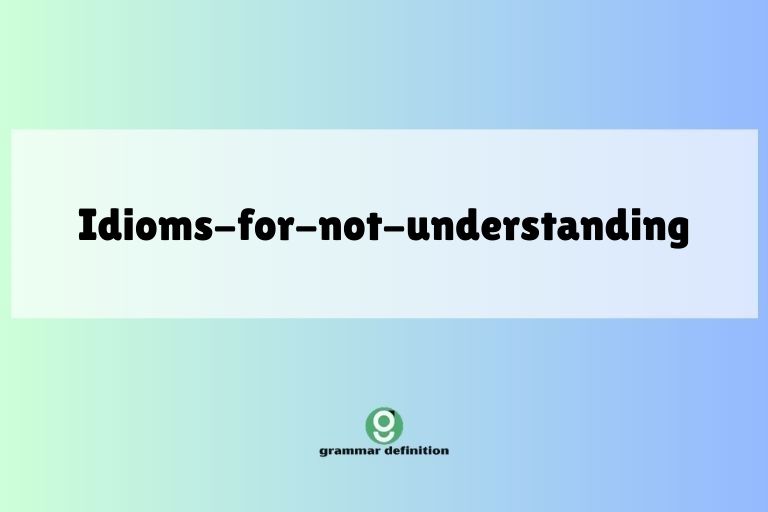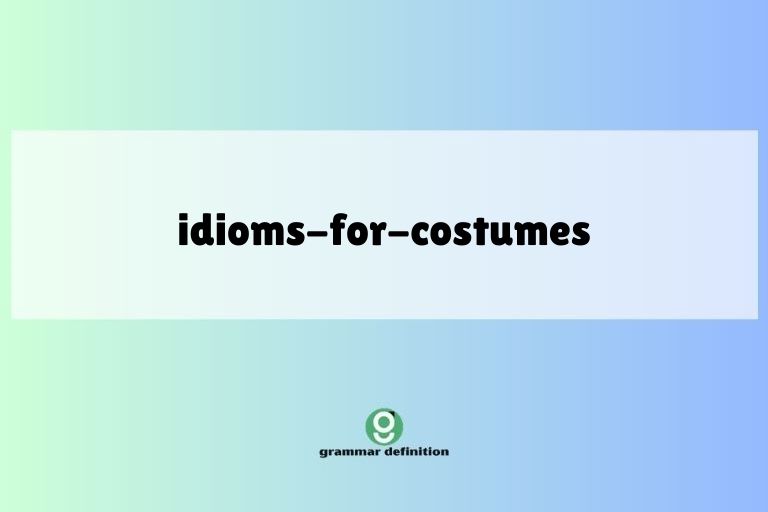Idioms for Not Understanding: A Comprehensive Guide

English is full of colorful expressions, and idioms are a prime example. Among the many types of idioms, those that describe a lack of understanding are particularly useful in everyday conversation.
Mastering these idioms can significantly improve your comprehension and fluency, allowing you to express yourself more vividly and connect with native speakers on a deeper level. This article will delve into the world of idioms for not understanding, providing definitions, examples, usage rules, and practice exercises to help you confidently incorporate them into your vocabulary.
Whether you’re a beginner or an advanced learner, this guide will offer valuable insights and practical tools to enhance your English skills.
Table of Contents
- Introduction
- Definition of Idioms for Not Understanding
- Structural Breakdown of Idioms
- Types and Categories of Idioms for Not Understanding
- Examples of Idioms for Not Understanding
- Usage Rules for Idioms
- Common Mistakes When Using Idioms
- Practice Exercises
- Advanced Topics: Nuances and Regional Variations
- Frequently Asked Questions
- Conclusion
Definition of Idioms for Not Understanding
An idiom is a phrase or expression whose meaning cannot be understood from the ordinary meanings of the words in it. It is a fixed expression with a figurative meaning that is different from the literal meaning of its individual components.
Idioms for not understanding are a subset of these phrases that specifically convey a lack of comprehension, confusion, or an inability to grasp a concept. These idioms often use metaphorical language to describe the mental state of someone who is struggling to understand something.
Classification: Idioms for not understanding fall under the broader category of idiomatic expressions. They are a type of figurative language, often used to add color and expressiveness to communication. They are categorized by their function, which is to describe a state of incomprehension.
Function: The primary function of these idioms is to express that someone does not understand something. They can be used to convey varying degrees of incomprehension, from mild confusion to complete bewilderment. Using these idioms can make your speech more engaging and relatable, as they often reflect common, shared experiences of struggling to understand something.
Contexts: These idioms are used in a wide range of contexts, from casual conversations to formal settings. They are commonly found in literature, movies, and television shows. When using idioms, it’s important to consider your audience and the level of formality of the situation. Some idioms may be more appropriate for informal settings, while others can be used in more formal contexts.
Structural Breakdown of Idioms
Understanding the structure of idioms can help you recognize and use them more effectively. Idioms can take various forms, including:
- Phrasal Verbs: These consist of a verb and a preposition or adverb, such as “go over one’s head.”
- Noun Phrases: These are groups of words containing a noun, such as “a fog.”
- Clauses: These are groups of words containing a subject and a verb, such as “it’s all Greek to me.”
- Similes and Metaphors: These use comparisons to convey meaning, such as “like talking to a brick wall.”
The key characteristic of an idiom is that its meaning is not predictable from the individual words. For example, “go over one’s head” does not literally mean to move something above someone’s head.
Instead, it means that something is too difficult for someone to understand.
Many idioms also have a fixed structure, meaning that the words cannot be changed or rearranged without altering the meaning. For instance, you can’t say “over one’s head go” and retain the same meaning.
The phrase “go over one’s head” must remain in that specific order to be understood as an idiom.
Types and Categories of Idioms for Not Understanding
Idioms for not understanding can be broadly categorized into several types, depending on the specific nuance they convey:
Idioms Implying a Mental Blank
These idioms suggest a temporary inability to recall or understand something, often due to surprise, confusion, or stress. They imply a momentary lapse in cognitive function.
Idioms Implying Confusion
These idioms express a state of being puzzled, disoriented, or unable to make sense of something. They often suggest that the information is unclear or contradictory.
Idioms Implying an Inability to Grasp
These idioms indicate a more fundamental difficulty in understanding a concept or idea. They suggest that the person lacks the necessary knowledge or skills to comprehend the information.
Idioms Implying a General Lack of Comprehension
These idioms are used to express a general failure to understand something, without specifying the reason. They can be used in a wide range of situations, from simple misunderstandings to complex intellectual challenges.
Examples of Idioms for Not Understanding
Here are some examples of idioms for not understanding, categorized by type:
Examples of Idioms Implying a Mental Blank
The following table presents idioms that imply a mental blank, along with their meanings and example sentences.
| Idiom | Meaning | Example Sentence |
|---|---|---|
| My mind went blank. | I couldn’t remember anything. | When the teacher called on me, my mind went blank, and I couldn’t answer the question. |
| It slipped my mind. | I forgot about it. | I meant to call you yesterday, but it completely slipped my mind. |
| I drew a blank. | I couldn’t think of anything. | I tried to remember his name, but I drew a blank. |
| I had a mental block. | I was unable to think clearly. | I had a mental block during the exam and couldn’t solve the problem. |
| It’s on the tip of my tongue. | I almost remember it. | Her name is on the tip of my tongue, but I just can’t recall it. |
| Lost for words | Unable to speak due to surprise or confusion. | When he proposed, she was completely lost for words. |
| Brain fart | A temporary mental lapse or inability to think clearly. | I had a total brain fart and forgot my own phone number. |
| Come up short | Fail to remember or produce something needed. | I needed to quote a famous poem, but I came up short. |
| Blank out | To forget something temporarily. | I completely blanked out during the presentation. |
| Miss a beat | Pause briefly, often due to confusion or surprise. | He missed a beat when she told him she was moving. |
| Go out of one’s head | To be forgotten. | The details of the meeting completely went out of my head. |
| Not ring a bell | Not sound familiar; not be remembered. | That name doesn’t ring a bell. Have we met before? |
| Forgot more than you ever knew | A humorous way of saying someone has forgotten a lot. | He’s forgot more than you ever knew about astrophysics. |
| Out of sight, out of mind | Something easily forgotten when not visible or present. | I haven’t seen him in years; it’s a case of out of sight, out of mind. |
| Clean slate | To forget or disregard past mistakes to start anew. | Let’s give him a clean slate and see how he performs this quarter. |
| Off the top of one’s head | From memory, without preparation. | I don’t know the exact number off the top of my head. |
| It’s gone to the great beyond | A humorous way of saying something is completely forgotten. | That information has gone to the great beyond, I can’t remember it at all. |
| Lost in the mists of time | Forgotten because it happened a long time ago. | The exact details are lost in the mists of time. |
| Faded from memory | Something that is gradually forgotten. | The details of that summer have faded from my memory. |
| Gone with the wind | Passed and forgotten. | All my worries about the project have gone with the wind now that it’s completed. |
Examples of Idioms Implying Confusion
The following table presents idioms that imply confusion, along with their meanings and example sentences.
| Idiom | Meaning | Example Sentence |
|---|---|---|
| I’m in a fog. | I’m confused and disoriented. | I’m in a fog after that long meeting; I need a break. |
| I’m at sea. | I’m lost and confused. | I’m at sea with these new software updates. |
| I’m mixed up. | I’m confused and uncertain. | I’m all mixed up about the directions to the party. |
| I’m baffled. | I’m completely confused. | I’m completely baffled by his behavior. |
| I’m drawing a blank. | I’m unable to understand or remember something. | I’m drawing a blank on what he was talking about. |
| Clear as mud | Not clear at all; very confusing. | The instructions were as clear as mud. |
| Head is spinning | Feeling dizzy or confused. | After the lecture, my head was spinning with all the new information. |
| In a muddle | In a state of confusion. | I am in a muddle about which train to catch. |
| Lost the plot | Lost track of what’s happening or being discussed. | I completely lost the plot during the conference call. |
| Around the bend | Slightly crazy or very confused. | This puzzle is driving me around the bend. |
| In a haze | In a confused or unclear state of mind. | I was in a haze after waking up from the anesthesia. |
| Not know whether one is coming or going | To be completely confused and disoriented. | With all these changes, I don’t know whether I’m coming or going. |
| All over the place | Disorganized or confused. | My thoughts are all over the place today. |
| In sixes and sevens | In a state of confusion or disarray. | Ever since the news, she’s been in sixes and sevens. |
| At a loss | Confused and uncertain about what to do. | I’m at a loss as to how to fix this problem. |
| Not able to make head nor tail of something | Unable to understand something at all. | I can’t make head nor tail of this instruction manual. |
| In a whirl | In a state of great activity and confusion. | My life has been in a whirl since I started the new job. |
| Like a chicken with its head cut off | Acting in a frantic, disorganized manner. | He was running around like a chicken with its head cut off trying to meet the deadline. |
| In the dark | Uninformed about something. | They kept me in the dark about their plans. |
| Bushed | Tired and confused. | After the long hike, I was completely bushed. |
Examples of Idioms Implying an Inability to Grasp
The following table presents idioms that imply an inability to grasp something, along with their meanings and example sentences.
| Idiom | Meaning | Example Sentence |
|---|---|---|
| It’s all Greek to me. | I don’t understand it at all. | This computer code is all Greek to me. |
| It goes over my head. | I can’t understand it; it’s too complicated. | Quantum physics goes completely over my head. |
| I can’t wrap my head around it. | I can’t understand it; it’s too complex. | I can’t wrap my head around the new tax laws. |
| I’m not following you. | I don’t understand what you’re saying. | I’m not following you; can you explain it again? |
| I don’t get it. | I don’t understand. | I don’t get it; what’s the point of this exercise? |
| Beyond me | Too difficult for someone to understand. | Advanced calculus is beyond me. |
| Not have a clue | To have no understanding or idea about something. | I don’t have a clue how to fix this computer. |
| Not know beans about | To know nothing about something. | He doesn’t know beans about cars. |
| Miss the point | Fail to understand the main idea. | I think you’re missing the point of the discussion. |
| Not see the forest for the trees | To be so focused on details that one misses the bigger picture. | He’s so caught up in the details that he can’t see the forest for the trees. |
| Come to nothing | To fail to produce the intended result. | All our efforts to persuade him came to nothing. |
| Get nowhere | Make no progress or achieve no result. | We’re getting nowhere with this negotiation. |
| Beats me | I don’t know. | “Where did he go?” “Beats me.” |
| Over one’s head | Too difficult to understand. | The technical jargon was completely over my head. |
| Not compute | Not make sense or be understandable. | The explanation just doesn’t compute. |
| Like talking to a brick wall | Trying to communicate with someone who isn’t listening or understanding. | Trying to explain the rules to him is like talking to a brick wall. |
| A closed book | Something or someone that is mysterious or difficult to understand. | Quantum physics remains a closed book to me. |
| Can’t make sense of | Unable to understand. | I can’t make sense of these instructions. |
| Not click | Fail to understand or connect with something. | The idea just didn’t click with me. |
| Lost on someone | Not understood by someone. | The joke was completely lost on him. |
Examples of Idioms Implying a General Lack of Comprehension
The following table presents idioms that imply a general lack of comprehension, along with their meanings and example sentences.
| Idiom | Meaning | Example Sentence |
|---|---|---|
| I’m in the dark. | I don’t know anything about it. | I’m in the dark about the company’s new strategy. |
| I haven’t got a clue. | I have no idea. | I haven’t got a clue what he’s talking about. |
| I’m none the wiser. | I still don’t understand. | After his explanation, I’m none the wiser. |
| It’s double Dutch to me. | I can’t understand it at all. | This legal jargon is double Dutch to me. |
| I’m stumped. | I’m unable to answer or understand something. | I’m stumped; I don’t know how to solve this problem. |
| No idea | Completely unaware. | I have no idea what you’re talking about. |
| Haven’t the foggiest idea | To have absolutely no idea. | I haven’t the foggiest idea why she’s upset. |
| Left me speechless | Surprised or shocked to the point of being unable to speak. | Her sudden resignation left me speechless. |
| Not register | Fail to be noticed or understood. | The warning signs didn’t register with him. |
| Not sink in | Fail to be fully understood or realized. | The news of his promotion hasn’t sunk in yet. |
| Not get through to someone | Fail to communicate effectively with someone. | I can’t seem to get through to him about the importance of deadlines. |
| Be a mystery to someone | Be something that someone cannot understand. | Why she likes him is a mystery to me. |
| Make no sense | Be illogical or incomprehensible. | His explanation makes no sense. |
| Go in one ear and out the other | Be heard but not listened to or understood. | Everything I tell him just goes in one ear and out the other. |
| Missed the boat | Missed an opportunity or failed to understand something in time. | He completely missed the boat on that investment opportunity. |
| A riddle wrapped in a mystery inside an enigma | Something completely baffling and mysterious. | His behavior is a riddle wrapped in a mystery inside an enigma. |
| No rhyme or reason | Lacking any logical explanation or purpose. | There’s no rhyme or reason to these decisions. |
| All Greek | Unintelligible; impossible to understand. | This technical manual is all Greek to me. |
| A blank stare | A look indicating a lack of understanding or comprehension. | I was met with a blank stare when I asked for help. |
| Not know the first thing about | To be completely ignorant about something. | I don’t know the first thing about gardening. |
Usage Rules for Idioms
Using idioms correctly requires attention to several rules:
- Context: Choose idioms that are appropriate for the context of the conversation or writing. Some idioms are informal and should be avoided in formal settings.
- Audience: Consider your audience’s familiarity with idioms. If you are speaking to non-native speakers, it’s best to use idioms sparingly and explain their meaning when necessary.
- Grammar: Ensure that the idiom fits grammatically within the sentence. Use the correct verb tense and subject-verb agreement.
- Word Order: Idioms often have a fixed word order. Do not change the order of words within the idiom, as this can alter the meaning or make it nonsensical.
- Overuse: Avoid overusing idioms, as this can make your speech sound unnatural or contrived.
Exceptions: Some idioms can be modified slightly to fit the context. For example, you can change the tense of the verb or use a possessive pronoun. However, be careful not to alter the idiom too much, as this can make it unrecognizable.
Common Mistakes When Using Idioms
Learners often make the following mistakes when using idioms:
- Literal Interpretation: Interpreting the idiom literally instead of understanding its figurative meaning.
- Incorrect Word Choice: Substituting words within the idiom with similar words, which can change the meaning or make it nonsensical.
- Grammatical Errors: Using the wrong verb tense or subject-verb agreement within the idiom.
- Contextual Inappropriateness: Using an idiom in a context where it is not appropriate, such as a formal setting.
- Overuse: Using too many idioms in a short period, making the speech sound unnatural.
Here are some examples of common mistakes and their corrections:
| Incorrect | Correct | Explanation |
|---|---|---|
| I’m in a cloud. | I’m in a fog. | “Fog” is the correct idiom to express confusion. |
| It went over my head. | It goes over my head. | Use “goes” to indicate a general inability to understand. |
| I don’t take it. | I don’t get it. | “Get it” is the correct idiom for understanding. |
| He has no idea what talks about he. | He hasn’t got a clue what he’s talking about. | Correct word order and verb tense are essential. |
Practice Exercises
Test your understanding of idioms for not understanding with these exercises.
Exercise 1: Fill in the blanks with the correct idiom.
| Question | Answer |
|---|---|
| I tried to understand the lecture, but it was all ________ to me. | Greek |
| I meant to remember her birthday, but it completely ________. | slipped my mind |
| When they asked me the question, my ________ went blank. | mind |
| I ________ how to fix this problem. | haven’t got a clue |
| After the long meeting, I was completely ________ about what to do next. | at sea |
| The instructions were so complicated that they were as ________. | clear as mud |
| I can’t ________ the new software; it’s too complex. | wrap my head around |
| He tried to explain it, but I’m still ________. | none the wiser |
| I’m afraid I ________ the point of your argument. | missed |
| The details of that event are ________. | lost in the mists of time |
Exercise 2: Choose the correct idiom to complete the sentence.
- After the confusing explanation, I was (a) in a fog, (b) in a cloud, (c) in the rain.
- I tried to remember his name, but I (a) drew a picture, (b) drew a blank, (c) drew a line.
- This problem is (a) over my head, (b) under my feet, (c) beside my body.
- I (a) haven’t got a hint, (b) haven’t got a clue, (c) haven’t got a sign what he’s talking about.
- The explanation just doesn’t (a) compute, (b) add, (c) count.
Answers:
- (a) in a fog
- (b) drew a blank
- (a) over my head
- (b) haven’t got a clue
- (a) compute
Exercise 3: Match the idiom with its meaning.
| Idiom | Meaning |
|---|---|
| 1. It’s all Greek to me. | a. I forgot about it. |
| 2. It slipped my mind. | b. I don’t understand it at all. |
| 3. I’m stumped. | c. I’m unable to answer or understand something. |
| 4. Not know the first thing about | d. Be completely ignorant about something. |
| 5. Head is spinning | e. Feeling dizzy or confused. |
Answers:
- 1-b
- 2-a
- 3-c
- 4-d
- 5-e
Advanced Topics: Nuances and Regional Variations
Idioms can have subtle nuances that are not immediately apparent. For example, the idiom “I’m in the dark” can mean either “I don’t know anything about it” or “I’m being kept uninformed.” The specific meaning depends on the context.
Additionally, some idioms have regional variations. For example, the idiom “clear as mud” is more common in some English-speaking countries than others.
It’s important to be aware of these regional variations and to use idioms that are appropriate for your audience.
Another advanced topic is the use of idioms in creative writing. Skilled writers can use idioms in unexpected or unconventional ways to create a unique effect.
For example, they might twist an idiom to give it a new meaning or combine two idioms to create a humorous effect.
Frequently Asked Questions
- What is the difference between an idiom and a metaphor?
An idiom is a fixed expression with a figurative meaning that is different from the literal meaning of its individual components. A metaphor is a figure of speech that directly compares two unrelated things. While some idioms may contain metaphors, not all metaphors are idioms. The key difference is that an idiom has a fixed meaning, while a metaphor is a more flexible and creative comparison.
- How can I learn more idioms?
The best way to learn idioms is to read widely, listen to native speakers, and pay attention to the context in which idioms are used. You can also use idiom dictionaries and online resources to learn new idioms and practice using them.
- Is it okay to use idioms in formal writing?
It depends on the specific idiom and the level of formality of the writing. Some idioms are perfectly acceptable in formal writing, while others are more appropriate for informal settings. When in doubt, it’s best to avoid using idioms in formal writing or to choose idioms that are widely understood and considered appropriate for the context.
- How can I avoid making mistakes when using idioms?
The best way to avoid making mistakes is to learn the meaning and usage of idioms thoroughly. Pay attention to the context in which idioms are used and practice using them in your own speech and writing. If you are unsure about the meaning or usage of an idiom, it’s best to avoid using it or to consult a dictionary or online resource.
- Are there any idioms that should be avoided?
Some idioms may be considered offensive or inappropriate in certain contexts. It’s important to be aware of these idioms and to avoid using them. Additionally, some idioms may be difficult for non-native speakers to understand, so it’s best to use them sparingly when speaking to non-native speakers.
- How important is it to learn idioms?
Learning idioms is crucial for achieving fluency and a deeper understanding of the English language. Idioms are frequently used in everyday conversation, literature, and media. Understanding idioms allows you to comprehend the intended meaning behind expressions and communicate more effectively and naturally. While it’s not essential to know every idiom, a good grasp of common idioms will significantly enhance your English skills.
- Can the meaning of an idiom change over time?
Yes, the meaning of an idiom can evolve over time, although this is a gradual process. As language and culture change, the way idioms are understood and used may shift. Some idioms may become obsolete, while new idioms may emerge. It’s always a good idea to stay updated with current language trends to ensure you’re using idioms correctly and appropriately.
- Is it possible to create new idioms?
While most idioms have established meanings, it’s possible for new idioms to emerge organically through common usage. However, for a new phrase to become a recognized idiom, it needs to gain widespread acceptance and usage within the language community. This process typically takes time and requires the phrase to be used consistently with a specific figurative meaning.
Conclusion
Mastering idioms for not understanding is an essential step towards achieving fluency and a deeper understanding of the English language. By understanding the definitions, usage rules, and common mistakes associated with these idioms, you can confidently incorporate them into your vocabulary and communicate more effectively.
Remember to consider the context, audience, and level of formality when using idioms. With practice and attention to detail, you can unlock the power of idioms and enhance your English skills.
Continue to explore and practice using these idioms in your daily conversations and writing. Pay attention to how native speakers use them and don’t be afraid to experiment with them yourself.
The more you use idioms, the more natural they will become, and the more confident you will be in your ability to communicate effectively in English. Keep learning, keep practicing, and enjoy the journey of mastering the English language!






